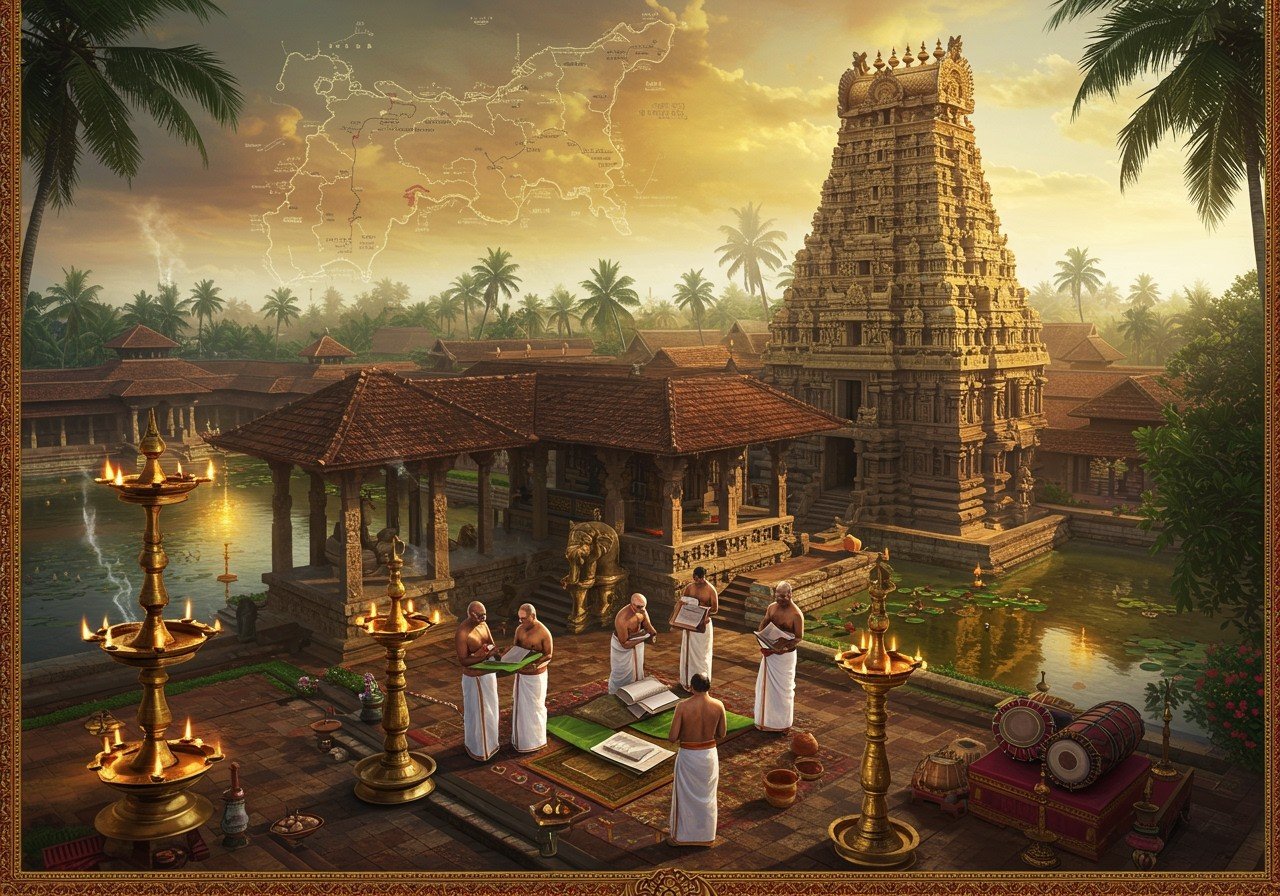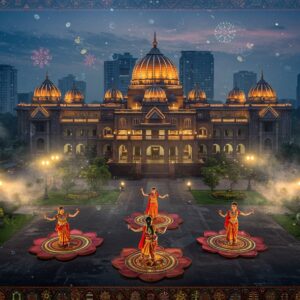
Nestled in the heart of Kerala’s vibrant cultural landscape, the Travancore Devaswom Board plays a pivotal role in preserving the sanctity and traditions of countless temples. This revered institution, responsible for the administration of over 1200 temples, including the world-renowned Sabarimala Ayyappan Temple, acts as a bridge between the spiritual heritage of the past and the evolving needs of the present day. It skillfully balances the preservation of ancient customs with the adoption of modern practices, ensuring the smooth functioning and continued flourishing of these sacred spaces.
What is the Travancore Devaswom Board?
The Travancore Devaswom Board (TDB) is an autonomous body, established under the Travancore Cochin Hindu Religious Institutions Act XV of 1950, entrusted with the management of a vast network of temples across Kerala. More than just an administrative entity, the TDB acts as a custodian of Kerala’s rich temple heritage. It ensures the seamless execution of daily rituals, the upkeep of temple properties, and the well-being of both pilgrims and temple staff.
From grand festivals that resonate with centuries-old traditions to the quiet solace of daily prayers, the TDB strives to create an environment where devotees can connect with their faith. This commitment to preserving our spiritual heritage while embracing modern advancements makes the TDB an integral part of Kerala’s cultural fabric.
Is the Travancore Devaswom Board Government or Private?
The Travancore Devaswom Board occupies a unique position as an autonomous body operating under the purview of the Kerala government. Constituted under the Travancore Cochin Hindu Religious Institutions Act XV of 1950, it manages over 1200 temples, including the iconic Sabarimala Temple. This semi-autonomous structure allows the TDB the necessary flexibility to administer temple affairs while maintaining accountability to the government.
The board’s leadership comprises a President and two members, all appointed by the government. This structure ensures representation from diverse religious communities, reflecting the TDB’s commitment to inclusivity and the harmonious coexistence of different faiths. The TDB receives funding from various sources, including government grants and temple revenues, which are meticulously utilized for temple maintenance, staff welfare, and enhancing pilgrim experiences.
History of the Travancore Devaswom Board
The seeds of the Travancore Devaswom Board were sown long ago in the princely state of Travancore. In 1811, Maharani Gouri Lakshmi Bayi initiated significant reforms in temple administration with a landmark proclamation, laying the groundwork for a more structured and transparent system of management.
The post-independence era brought about pivotal changes, particularly with the formation of the Travancore-Cochin state. The enactment of the Travancore Cochin Hindu Religious Institutions Act XV of 1950 formalized the board’s structure and responsibilities. Subsequent integration of temples from the erstwhile Cochin state further solidified the board’s role in preserving Kerala’s rich temple traditions.
Roles and Responsibilities
The Travancore Devaswom Board肩负着广泛的责任,涵盖了寺庙生活的方方面面。它确保了仪式的顺利进行,这是维护精神活力的关键。董事会通过翻新项目来保护寺庙建筑,从而维护喀拉拉邦的文化遗产。
寺庙工作人员的福利是一个优先事项,并采取了医疗保健和养老金计划等措施。董事会通过吠陀学校和培训中心促进宗教教育,培养后代。它参与社会福利活动,提供救灾和社区发展。
- Pilgrim Welfare: The TDB prioritizes the comfort and safety of pilgrims, ensuring a peaceful and fulfilling spiritual experience. This involves managing crowd flow, providing amenities, and maintaining cleanliness within temple premises. The board also plays a crucial role in disseminating information to pilgrims, guiding them through the various rituals and customs.
- Temple Maintenance and Development: The TDB is responsible for the upkeep and renovation of temple structures, preserving their architectural heritage and sanctity. This includes regular maintenance, restoration projects, and the development of surrounding areas to enhance the overall pilgrim experience. The board also oversees the procurement of necessary materials for rituals and ceremonies.
- Staff Welfare: The board recognizes the dedicated service of temple staff and prioritizes their well-being. It provides fair wages, healthcare benefits, and other welfare measures to ensure a secure and supportive environment for those who contribute to the daily functioning of the temples. The TDB also facilitates training programs to enhance their skills and knowledge.
- Ritual and Prasadam Management: The TDB oversees the proper conduct of rituals and ceremonies according to traditional practices. It also provides guidelines for the preparation and distribution of sacred Prasadam, ensuring its quality and hygiene. The board ensures that these sacred offerings are accessible to all devotees.
- Legal Representation: The TDB represents the interests of the temples in legal matters, protecting their rights and properties. This includes addressing disputes, managing legal documentation, and ensuring compliance with relevant regulations. The board’s legal team works diligently to safeguard the sanctity and autonomy of the temples.
透明度和问责制对董事会的运作至关重要。通过坚持这些价值观,它在奉献者和利益相关者之间建立了信任。
Modern Challenges and Adaptations
In today’s rapidly changing world, the Travancore Devaswom Board faces the challenge of managing an ever-increasing number of devotees, often straining existing infrastructure. To address this, the board has embraced digital solutions, introducing online booking systems for darshan and offerings, making access more convenient for devotees.
Balancing tradition with technology is a delicate act. The TDB also emphasizes environmental sustainability in temple management, implementing waste management systems, particularly during large festivals. Furthermore, the board promotes inclusive practices, ensuring accessibility for differently-abled devotees. These adaptations demonstrate the TDB’s commitment to preserving tradition while addressing contemporary needs.
How Poojn.in Supports Your Temple Rituals and Offerings
Poojn.in understands the deep significance of rituals and traditions in our lives. We are proud to support devotees in their spiritual journey by offering a wide selection of authentic puja items, perfectly suited for the sacred rituals observed in temples under the Travancore Devaswom Board. Whether you are seeking traditional brass lamps (nilavilakku), pure copper vessels, premium quality camphor and sambrani, or specific oils for temple lamps, Poojn.in provides a convenient and reliable platform to acquire everything you need.
Explore our curated collection of puja essentials:
- Traditional Kerala-style brass lamps (nilavilakku) to illuminate your prayers.
- Pure copper vessels, crafted with precision for temple ceremonies.
- Premium quality camphor, sambrani, and other dhoop items to create a sacred ambiance.
- Traditional Kerala-style oil for temple lamps, ensuring purity and authenticity.
- Looking for a specific Hanuman idol for your home altar? We have a wide selection of Panchmukhi Hanuman idols available in different sizes.
- Enhance your puja space with the divine presence of Lord Kubera with our exquisite brass Kubera idols.
Experience the convenience of shopping with Poojn.in:
- Easy Ordering: Visit our website www.poojn.in, call us at 03369029784, or connect with us on WhatsApp at 9476142738.
- Quality Assurance: All our products meet stringent quality standards and come with assurance certificates, guaranteeing their suitability for temple rituals. We understand the importance of using pure and authentic materials in your spiritual practices.
- Free Shipping and Secure Payments: Enjoy free shipping across India and the peace of mind that comes with secure online payment options. Your convenience and security are our top priorities.
- Expert Guidance: Need help choosing the right products? Our knowledgeable customer service team provides expert guidance on product selection, ensuring you find exactly what you need for your specific rituals and ceremonies.
- Bulk Orders: Planning a large temple event or festival? We cater to bulk orders, providing seamless service and ensuring timely delivery of all your puja essentials.
Conclusion
The Travancore Devaswom Board stands as a testament to the enduring power of tradition in a world embracing modernity. This remarkable institution not only manages the day-to-day operations of over 1200 temples, including the revered Sabarimala Temple, but also acts as a guardian of Kerala’s rich cultural heritage.
From ensuring the smooth execution of daily rituals to undertaking extensive temple renovations, the TDB’s multifaceted role touches every aspect of temple life. By prioritizing pilgrim welfare, supporting temple staff, and embracing sustainable practices, the TDB exemplifies a harmonious blend of tradition and progress. Its commitment to transparency and inclusivity further strengthens the bond of trust with the community it serves, ensuring the spiritual vitality of these sacred spaces for generations to come.


